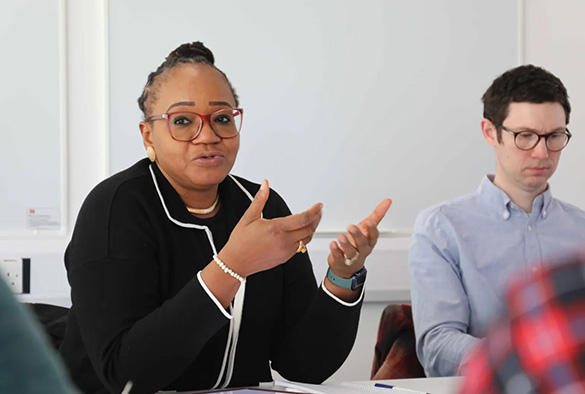Antimicrobial resistance: ensuring data-led action

The Heseltine Institute for Public Policy, Practice and Place at the University of Liverpool recently hosted an important policy roundtable, held in collaboration with the Fleming Fund. Bringing together leading researchers, UK policymakers, and Fleming Fellows, the discussion centred on how to ensure data remains at the forefront of decision-making in addressing antimicrobial resistance (AMR).
With estimates suggesting that by 2050, AMR-related deaths could double—potentially resulting in 40 million lives lost—the urgency of coordinated, data-driven action has never been greater. The roundtable provided a platform to explore how political prioritisation of AMR can be sustained, how data can be effectively communicated, and how policy responses can be better informed by the growing body of evidence.
The Fleming Fund is a UK aid programme managed by the Department of Health and Social Care (DHSC) that supports low- and middle-income countries in strengthening their capacity to tackle antimicrobial resistance (AMR). It funds surveillance systems, laboratory infrastructure, workforce development, and policy initiatives across more than 25 countries in Africa and Asia, ensuring data-driven responses to AMR.
Professor Liz Richardson, a public policy expert at the University of Manchester and participant in the roundtable, highlighted the challenge of ensuring AMR stays high on the global agenda:
“AMR is a textbook example of a ‘slow-burning’ crisis—one that lacks the immediacy of a pandemic but is no less threatening. The challenge lies in translating data into sustained political action. Policymakers are often dealing with competing priorities, so we need to make AMR data compelling, accessible, and impossible to ignore.”
The event featured insights from Fleming Fellows, who play a pivotal role in tackling AMR within their respective countries. Dr Tochi Okwor, Infection Prevention and Control Programme Coordinator and Chair of the AMR Co-ordination Committee at the Nigeria Centre for Disease Control and Prevention, and a Fleming Fellow, shared valuable perspectives on bridging the gap between data and policy implementation in Nigeria:
“In many lower- and middle-income countries, we are generating more AMR data than ever before, but the challenge is translating that into action. Policy decisions must be informed not just by numbers but by an understanding of local realities. A one-size-fits-all approach won’t work—tailored, context-specific strategies are key.”
The roundtable chair and Heseltine Institute Co-Director, Professor Catherine Durose said, “It is important to draw upon different kinds of data and evidence to inform compelling storytelling about the importance of AMR that doesn’t over science the issue, and can reach and engage different audiences”.
Discussions also focused on learning from other complex policy challenges. The panel explored how successes in vaccine access, sanitation, and health system strengthening could inform AMR strategies. Experts emphasised the need for a balance between investing in new technological solutions—such as artificial intelligence-driven diagnostics—and strengthening existing, proven interventions such as infection prevention measures and responsible antimicrobial use.
The roundtable forms part of the University of Liverpool’s professional development support for the UK Department of Health and Social Care’s Fleming Fund, a UK aid programme assisting over 25 countries in tackling AMR. As a host institution for Fleming Fellows from Nigeria and Sierra Leone, the University is helping to build global capacity for data-led AMR policy responses.
Reflecting on the event’s outcomes, participants stressed the importance of maintaining momentum beyond discussions. Concrete policy actions, greater cross-sector collaboration, and sustained funding for AMR research and intervention were among the key takeaways.
As AMR continues to pose a major global threat, ensuring that data translates into meaningful action remains a collective responsibility. Events such as this roundtable play a crucial role in fostering dialogue and driving progress in the fight against antimicrobial resistance.
This article was originally published by CAMO-Net on 22 February 2025.